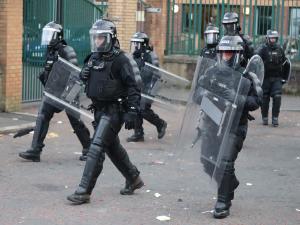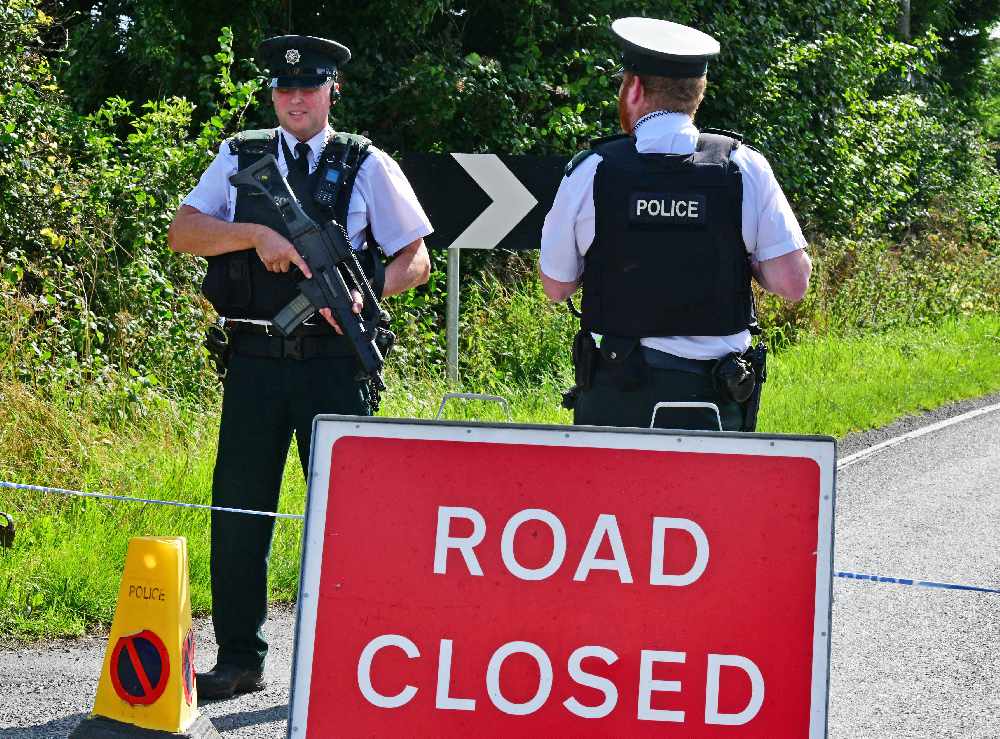
By Michael McHugh, PA
Tasers could be issued to more frontline police officers in Northern Ireland, inspectors said.
The incapacitating devices are a less-lethal alternative to firearms.
Her Majesty’s Inspectorate of Constabulary and Fire and Rescue Services (HMICFRS) conducted a wide-ranging review which found the PSNI generally treated its workforce and the public well.
The report said: “Most frontline PSNI officers aren’t issued with conducted energy devices (CEDs, such as Tasers).
“Those devices are less lethal than the firearms issued to all PSNI officers for personal protection purposes.
“Without immediate access to CEDs, frontline PSNI officers who respond to serious incidents involving dangerous people have fewer options available to them to resolve the incident with the minimum use of force.
“CEDs could be made available to more officers in the PSNI, but that would attract a high level of interest from communities.
“So, we recommend that the chief constable consult widely on any proposed changes and communicate the public safety benefits of such an approach, before any changes are made.”

Officers stand armed enforcing a road closure
PSNI deputy chief constable Mark Hamilton welcomed the overall “good” grading awarded by HMICFRS in the Police Effectiveness, Efficiency and Legitimacy inspection.
He added: “The availability of CEDs, as a tactical option, is one that we do not take for granted and their issue and use is subject to rigorous accountability and limited to a small group of specialist officers trained and accredited to national standards in its carriage and use.”
Patrick Corrigan, Amnesty International UK’s Northern Ireland director, said since these electro-shock devices were issued to the PSNI in 2008, their use has increased to the point where Tasers were drawn or fired on almost 750 occasions in the last two years.
He said: “Tasers are potentially lethal weapons, linked to hundreds of deaths in the USA and a growing number across the UK where they have been made increasingly available to police.”
Further roll out of Tasers would be a “serious mistake” for policing, the campaigner added.
“More Tasers would inevitably mean more mistakes, more misuse, more tragedy and consequent damage to community relations,” he said.
Other areas for improvement identified in the inspection included:
– Officers are not consistently submitting the correct form after incidents where they have used force.
HMICFRS said: “This means the service is not recording its use of force accurately.
“It needs to implement a system that identifies when a form is missing and prompts officers to submit one.”
– The service should improve its recording of stop and search data and the quality of its scrutiny, particularly external scrutiny, into the use of this power and its effect on communities.
– There remain two Protestants for every Catholic officer.
HM Inspectorate of Constabulary Matt Parr said the PSNI operated in a particularly complicated social and political environment.
“This can make it difficult for the service to build a positive relationship with some communities. In this context, it has done well to inspire confidence.
“The service treats the public fairly and respectfully.
“There are signs that the historically difficult relationship between the PSNI and some Catholic communities is improving.”
Her Majesty’s Inspectorate of Constabulary and Fire and Rescue Services - conducted a wide-ranging review, which found the PSNI generally treated its workforce and the public well.
Policing Board member John Blair has been speaking to Q Radio:
In some areas, officers are now more able to carry out neighbourhood policing using marked police vehicles and organise meetings with community leaders, the report noted.
It said more schools are now receptive to working with the PSNI’s school liaison officers.
Mr Hamilton said: “The inspection has shown that we have improved our response to preventing crime and tackling anti-social behaviour.
“It has also shown how we continue to plan well for the future and have a good understanding of the changing demands for the service.
“We are pleased that inspectors acknowledged our continuing work in reaching out to communities.
“We are also pleased to see our efforts to improve our well being provision, to our officers and staff, and we will continue to work to make it more accessible.”
“We acknowledge the recommendation for greater external scrutiny around stop and search powers.
“As a police service, we have a number of governance groups to oversee the use of police powers, including stop and search, to ensure that they are being used proportionately and effectively.”


 Nine Northern Ireland schools targeted with threatening email thought to be hoax
Nine Northern Ireland schools targeted with threatening email thought to be hoax
 Exhumed remains not those of Disappeared victim Joe Lynskey
Exhumed remains not those of Disappeared victim Joe Lynskey
 King and Queen conclude three-day visit to Northern Ireland
King and Queen conclude three-day visit to Northern Ireland
 Conor McGregor seeks to introduce new evidence in civil rape appeal case
Conor McGregor seeks to introduce new evidence in civil rape appeal case
 The UK’s ‘best places to live’ revealed in annual Sunday Times guide
The UK’s ‘best places to live’ revealed in annual Sunday Times guide